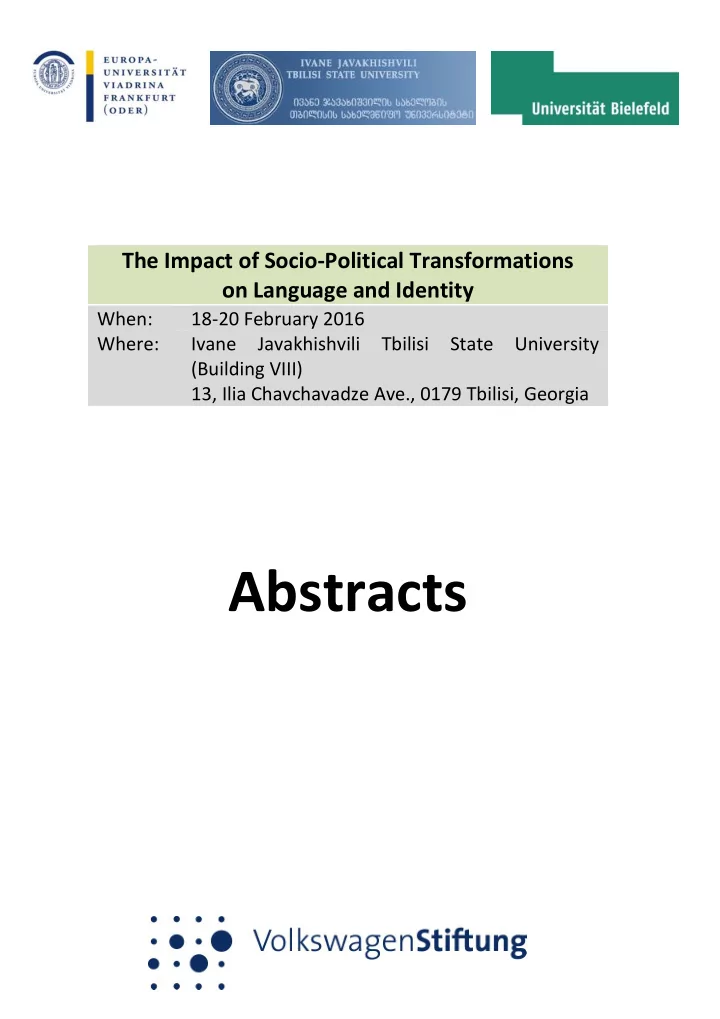

The Impact of Socio-Political Transformations on Language and Identity When: 18-20 February 2016 Where: Ivane Javakhishvili Tbilisi State University (Building VIII) 13, Ilia Chavchavadze Ave., 0179 Tbilisi, Georgia Abstracts
Content Christoph Schroeder: Clause combining in Turkish as a heritage language in Germany ............................................................................. 3 Astrid Menz: Turkic and Slavic in contact: Examples from Gagauz and Karaim ............................................................................................. 5 Kanavillil Rajagopalan: Language as a reflex of changing ................................................................................ 7 geopolitical realities Vikalp Kumar: Religious radicalization and linguistic identity: Sarazi and Kashmiri in Doda ................................................................... 8 Manana Tandaschwili: Endangered Caucasian Languages in Georgia: The Case of the Udi Language ................................................. 9 Peter Rosenberg: Language islands in the flood: Language change and language contact in German speaking communities in Russia and Brazil .............................................................................................. 10 Dionysios Zoumpalidis, Ekaterina Perekrest: Georgian identity in Russian context: The case of Moscow school with a Georgian ethno-cultural component .................................................................... 11 Tinatin Bolkvadze: Diglossia and Bilingualism in Georgia .................... 12 Nika Loladze: Greeks of Georgia: Characteristics of privileged labor migration .............................................................................................. 13 Concha Maria Höfler: Tracing the impact of socio-political transformations in the Greek community of Georgia ........................... 14 Johanna Lorenz: Subordination in a language contact situation: Complement clauses in Urum ............................................................... 15 Stefanie Böhm: Focus and word order - A comparative study of Turkish, Russian and Urum ................................................................... 16 ........................................... 17 Marika Jikia: Number in Turkish and Urum Ekaterine Kartvelishvili: Interrelation between Language and Identity among the Georgian Greek Community in Greece .................. 18
Natia Jalabadze, Liana Melikishvili: Some aspects of the correlation between heritage language and ethnic identity in multiethnic Georgia .............................................................................. 19 Zaal Kikvidze, Levan Pachulia, Nino Jikhvadze: Urum Echo Reduplication within Typological and Areal Frameworks: Intra- ................................................................... 20 and Extra-linguistic Factors Nutsa Tsetereli: Affix Order in Nominal Inflection: Violation of cross-linguistic preferences and the dative in Urum ............................. 21 Svetlana Berikashvili: Accommodation of transferred verbs in .......................................................... 22 Pontic Greek (spoken in Georgia) Rusudan Asatiani: The Common Typological Feature for Languages from the Caucasus: The ‘Disappearance’ of Accusative ...... 23 Konstanze Jungbluth: Convergence to an outgroup language? ....................................... 24 Identity construction in multilingual settings. Jost Gippert: Between co-existence and separation: the Ossetian case ....................................................................................................... 26 Moira Saltzman: Language contact and morphological change in Jejueo .................................................................................................... 27 Laurentia Schreiber: The impact of socio-political factors on language vitality: An attitudinal study of Romeyka ............................. 28 ............... 29 Ioanna Sitaridou: Towards a new phylogeny of Pontic Greek Stéphane Voell: Search for Identity in Space: Svan Spatial Practices in Multi-ethnic Southern Georgia .......................................... 31 Alexander Kartosia: Observations on the modern use of the ................................................................................ 32 Georgian language Stavros Skopeteas: Structure-building processes in language contact: on the emergence of head-initial verb phrases in Caucasian Urum .................................................................................... 33
The Impact of Socio-Political Transformations on Language and Identity Christoph Schroeder: Clause combining in Turkish as a heritage language in Germany University of Potsdam, Germany Clause combining is understood here as a superordinate term referring to any linguistic means of connecting utterances. Turkish (of Turkey) is a language described as predominantly relying on non-finite subordina- tion in the domain of clause combining (Göksel & Kerslake 2005, Kornfilt 1997). However, there are also strategies of finite subordination or co-subordination, as there are, obviously, strategies of paratactic as well as prosodic means of clause combining. The distribution between the different strategies has, for certain aspects of clause combining, repeatedly been described as a relationship of spoken and written register, whereby the non-finite structures rather belong to the written register and the finite structures rather to the spoken register (see Kerslake 2007 for non-finite versus finite strategies, Schroeder 2002 for clauses with the connector ki , Ozil 1993 and Erkman 1993 for the relationship between relative clauses and conditional clauses). With regard to clause combining in Heritage Turkish in Germany, I assume a typological change at work in the system of clause combining in this variety of Turkish, from more non-finite to more finite means of clause combining. This typological change is an outcome of interplay between the following three dynamics: - Generalization of structural elements of spoken Turkish, - generalization of structures with a structural and functional correspondence in the contact language German and - reduction or highly heterogeneous paths of acquisition concerning non-finite strategies of clause combining. Changes identified in Heritage Turkish in the domain of clause combin- ing are thus predominantly based on register variability and not on structural influence (“interference” ) from the contact language German. References Erkman- Akerson, Fatma. 1993. Türkçede eş işlevli dilbilgisel yapıların kullanım değerleri. [The use of linguistic constructions with parallel functions in Turkish] In: İmer, Kâmile & N. Engin Uzun (yay.). VII. Dilbilim Kurultayı bildirileri. 13 - 14 Mayıs 1993. (Proceedings of the Page 3
The Impact of Socio-Political Transformations on Language and Identity VII. Linguistics Conference] Ankara: Ankara Üniversitesi Basımevi, 95-103. Göksel, Aslı, Celia Kerslake. 2005. Turkish. A comprehensive grammar. (Comprehensive Grammars) London: Routledge. Kerslake, Celia. 2007. Alternative subordination strategies in Turkish. In: Rehbein, Jochen, Christiane Hohenstein, Lukas Pietsch (eds.). Connectivity in grammar and discourse. (Hamburg Studies on Multi- lingualism 5) Amsterdam: Benjamins, 231-258. Kornfilt, Jaklin. 1997. Turkish (Descriptive Grammars) London: Routledge. Ozil, Şeyda. 1993. Türkçede eş işlevli dilbilgisel yapılar. [Linguistic con - structions with parallel functions in Turkish] In: İmer, Kâmile & N. Engin Uzun (yay.). VII. Dilbilim Kurult ayı bildirileri. 13 - 14 Mayıs 1993. (Proceedings of the VII. Linguistics Conference] Ankara: Ankara Üniversitesi Basımevi , 85-97. Rehbein, Jochen; Herkenrath, Annette & Karakoç, Birsel. 2009. On contact-induced language change of Turkish as an immigrant language. Language Typology and Universals 62: 3, 171-204. Schroeder, Christoph. 2002. On the structure of spoken Turkish. Essener Linguistische Skripte 2: 1, 73-90 (Online). Page 4
Recommend
More recommend